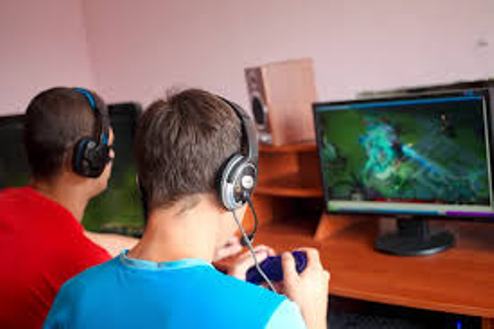LAGOS NOVEMBER 11TH (NEWSRANGERS)-Millions of people around the world choose video games every day for relaxation, socializing, or to boost their mood. Often, they become part of daily life, but questions are increasingly being raised: can games really affect mental health, and where is the line between benefit and risk? Modern scientific research allows us to look at this issue from different perspectives, offering new answers and sparking new discussions.
https://gamequitters.com/wp-content/uploads/gaming-affects-the-brain.png
Why is interest in this topic growing?
The video game industry is developing rapidly: according to Newzoo, in 2023 the number of gamers worldwide exceeded 3 billion people. And it’s not just children or teenagers, but people of all ages. The most popular genres are shooters, MOBA, and RPG. The popularity of virtual gambling games is also growing, as shown by search query statistics. While preparing this article, our authors found information on this site about the growing popularity of the game Plinko. Despite being prohibited for children, this gambling game is very successful among the adult audience.
The growth of the audience is attracting increasing attention from researchers and mental health specialists. Parents, educators, and the players themselves are seeking a balance between entertainment, development, and possible consequences of gaming. Interest in the topic intensifies as games become an integral part of modern culture and leisure.
How scientists study the impact of video games on the psyche
Scientists from the Oxford Internet Institute published a comprehensive review in the journal Technology, Mind, and Behavior, in which they analyzed over 120 studies on the relationship between video games and mental health. The authors identified 13 main mechanisms through which games can affect a person’s psyche. According to the lead author, Nik Ballou, it is important not only to evaluate the overall impact of gaming, but also to analyze which games, in what environment, and for what purposes a person chooses. This approach helps to understand why the effects can be so varied.
Positive aspects of gaming
Modern research proves that video games can bring a number of significant psychological and cognitive benefits. The main positive effects include:
- Improvement of brain function: dynamic and complex games help develop attention, working memory, and the ability to multitask;
- Increased resilience to stress: regular gaming experience helps some people better cope with emotions and lower stress levels;
- Developing a sense of meaning: narrative games with moral choices and developed stories can inspire, evoke deep emotions, and even change one’s outlook on life;
- Development of identity: the opportunity to explore different roles, communicate with other players, and discover new aspects of one’s personality is especially important for teenagers;
- Games as part of therapy: special projects designed to support those with anxiety disorders or depression make treatment more accessible and appealing;
- Physical activity: some video games really help with fitness. Exergames, such as Dance Dance Revolution or Ring Fit Adventure, motivate people to move and improve overall well-being.
Positive changes are often noted both by the players themselves and by specialists in psychology.
When video games become a source of problems
However, excessive enthusiasm for games can lead to serious difficulties if moderation is lost or if content choices are poor. The main risks include:
- Gaming addiction: according to the World Health Organization, uncontrolled enthusiasm for games can lead to social isolation, decreased academic performance, and the appearance of depressive symptoms;
- Crowding out important activities: regularly neglecting sleep, physical activity, or studies in favor of games leads to a deterioration in quality of life;
- Financial losses: in-game purchases, loot boxes, and pay-to-win mechanics contribute to the development of gambling habits and overspending;
- Sexualization and discrimination: the presence of sexualized imagery and aggressive behavior in some games can negatively affect self-esteem and reinforce stereotypes;
- Increased loneliness: despite the abundance of online communities, some players experience a sense of detachment from the real world.
Research highlights that consequences depend on the frequency, content, and style of video game use.
The dual nature of gaming
The uniqueness of video games lies in the fact that they can bring both benefits and harm to the same people—it all depends on the circumstances. For example, many people use games as a way to cope with stress or loneliness. Moderate enthusiasm can really help maintain emotional balance, but attempts to escape from problems by immersing oneself completely in the virtual world often lead to decreased resilience to stress. Similarly, multiplayer games contribute to expanding one’s social circle, provide a sense of belonging and competence, but can also be a source of conflicts, resentment, and even cyberbullying. The difference between healthy passion and compulsive behavior is often determined by personal characteristics and context.
Does the genre of the game affect possible consequences?
The question of whether there are “dangerous” genres remains a subject of research. According to experts, problematic behavior is more common among fans of MMO and MOBA games, such as World of Warcraft or League of Legends. However, the games themselves are not the cause of negative changes, but rather attract a certain type of player. What matters is not the genre, but a combination of personal motives, habits, and the ability to regulate one’s time in-game. Nik Ballou also mentions this, who, after working on the study, preferred to give up competitive games in favor of single-player projects, noting a change in his emotional state.
Expert advice
Specialists recommend taking a conscious approach to game selection, analyzing your emotions and motives, and also paying attention to your circle of communication in the gaming environment. It is important for parents to maintain open dialogue with their children, helping them reflect on their gaming experience and avoid risks. The publication emphasizes that an individual approach and self-reflection can reduce negative consequences and enhance the positive aspects of gaming. Scientists also note the need for further research to better understand long-term effects and to develop effective recommendations.
The topic of the impact of video games on the psyche remains open for discussion and new discoveries. How can you tell if a game is beneficial or harmful to your mood and life? Only individual analysis of one’s own experience can answer this question. It is important to remain attentive to your own feelings and be ready to adjust your habits so that gaming truly brings joy and personal growth. Science continues to seek new approaches to studying this complex phenomenon, which means that the answers will become increasingly accurate and useful for everyone.
For media advert placement, events coverage, media consultancy, placement of publications and further inquiries please WhatsApp 2348023773039 or email: labakevwe@yahoo.com










